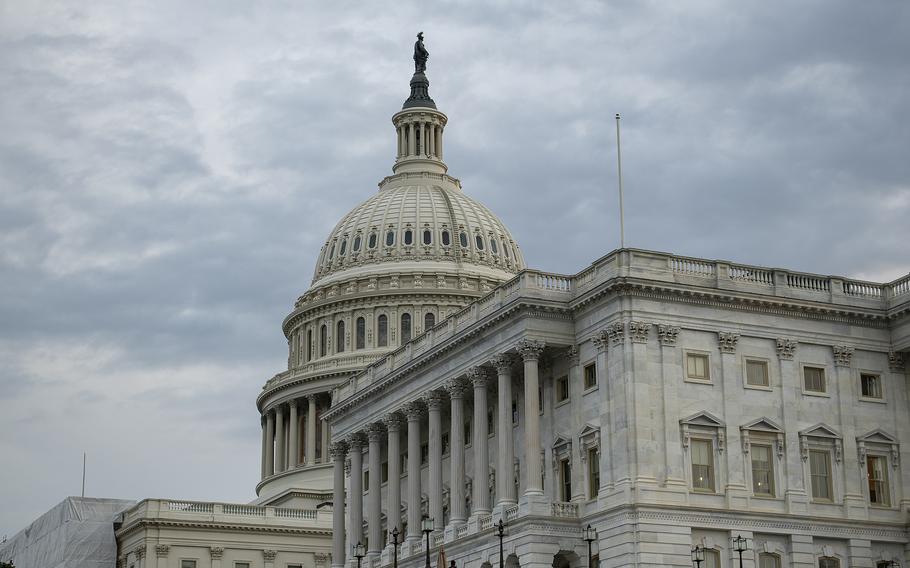
The U.S. Capitol as seen in Washington, D.C., on July 6, 2022. (Carlos Bongioanni/Stars and Stripes)
WASHINGTON — The debt-limit compromise on track to pass Congress will lock in Pentagon spending levels for the next two years, forcing lawmakers drafting annual defense policy legislation to stick to a budget that some on Capitol Hill consider insufficient to meet U.S. global threats.
The House on Wednesday night approved a deal to raise the nation’s debt ceiling over the reluctance of some defense hawks who for months had advocated for a significant increase to President Joe Biden’s $886 billion budget request for the Defense Department and other national security spending.
Instead, the proposed legislation caps military spending at the requested amount for fiscal 2024 — a 3.2% increase from last year — and slows national defense budget growth to 1% in fiscal 2025.
“That’s the worst part of the deal,” Senate Minority Leader Mitch McConnell, R-Ky., told reporters on Wednesday. “The defense buildup which we began in December peters out and is only up slightly.”
The Senate is expected to vote on the legislation before a projected June 5 deadline when the U.S. government is expected to run out of money and could default on its debts.
Republicans have traditionally called for defense spending increases of 3% to 5% above inflation. The Democratic chairman and top Republican on the Senate Armed Services Committee expressed concern in March that the Pentagon was particularly underfunding its largest service, the Army.
“I am confident my colleagues on a bipartisan basis, again, will join me to correct this inadequate budget,” Sen. Roger Wicker of Mississippi, the panel’s ranking Republican, said at the time.
Congress last year added $45 billion to President Biden’s defense spending request.
Sen. Lindsey Graham, R-S.C., vowed to find a way to again hike up the Pentagon’s budget, despite the constraints set by the debt-ceiling bill. He suggested suspending the debt limit for three months to give lawmakers time to sort out military funding shortfalls.
“I will use all powers available to me in the Senate to have amendment votes to undo this catastrophe for defense,” he wrote Monday on Twitter. “Have total disgust for political leaders’ decision to make it remotely possible to gut our national security apparatus at a time of great peril.”
Senate Majority Leader Chuck Schumer, D-N.Y., warned on Thursday that any changes to the legislation will force it back to the House and "almost guarantee default."
Republicans and defense-minded Democrats have encouraged strong Pentagon spending to counter the threat posed by Russian aggression, compete with China’s military buildup and prevent a potential Chinese invasion of Taiwan.
Rep. Mike Gallagher of Wisconsin, the Republican chairman of the new House Select Committee on China and a member of the House Armed Services Committee, said only Republican control of all three branches of government will be able to fix the defense funding holes in the debt-ceiling bill.
In the meantime, he said Congress can boost deterrence in the Indo-Pacific region by cutting waste and “repurposing” more than $25 billion in annual unspent Defense Department funds for investments in ships, long-range precision fires and other weapons systems.
“This would allow us to rebuild our arsenal of deterrence in the near-term and win the new Cold War in the long-term,” Gallagher said after voting for the bill.
Rep. Ken Calvert, R-Calif., the chairman of the House Appropriations Committee’s defense subpanel, expressed confidence this week that appropriators will be able to maneuver within the caps to deliver a more streamlined budget.
“I believe we can meet those goals by cutting funding for misguided Defense Department priorities that aren’t related to national security, optimizing the workforce and creating incentives for disruption to create competition and lower costs,” he said in a statement.
The expected passage of the debt-ceiling compromise will allow Congress to move forward with crafting a spending bill for the Pentagon as well as the annual National Defense Authorization Act, which sets defense priorities. Work on both had stalled as House Republicans and the White House negotiated the debt limit.
Travis Sharp, a fellow at the Washington-based Center for Strategic and Budgetary Assessments think tank and a Navy Reserve officer, said the spending caps will force “more horse-trading, more give-and-take” in Congress as lawmakers accustomed to beefing up the Defense Department are held back.
“There’s been this ratcheting effect in recent years with first the administration’s [budget] increases and then Congress’ increases. Well, that’s not going to happen anymore because of the caps so Congress will have to work pretty furiously during the NDAA and appropriations process to figure which priorities to include under the cap versus those to exclude,” he said.
Potential cuts could affect the Pentagon’s operations and maintenance and research and development accounts because they are large and have excess that can be trimmed, he said. Lawmakers are unlikely to touch expenses for military personnel amid a recruiting crisis or the budget for weapons procurement because those systems are often produced by their constituents, Sharp said.
There are also ways that defense hawks in Congress could seek to go around the caps, he said. They might ask to revisit the debt-ceiling agreement in six months or a year or more plausibly, pack additional spending into the supplemental bills for the war in Ukraine. That funding is exempt from limits.
“You can imagine Congress taking a broader definition of what is related to Ukraine and trying to stuff more items into the supplemental,” Sharp said. “However, fiscal conservatives have already expressed a lot of skepticism about the money the U.S. is spending on Ukraine so they are going to be very wary about that.”